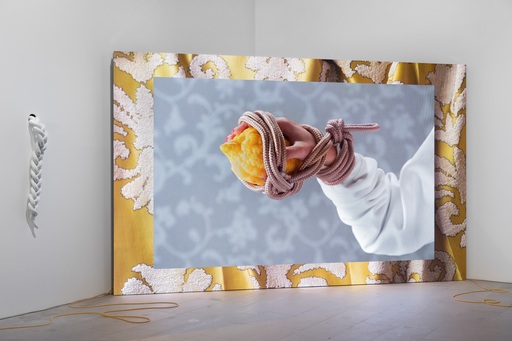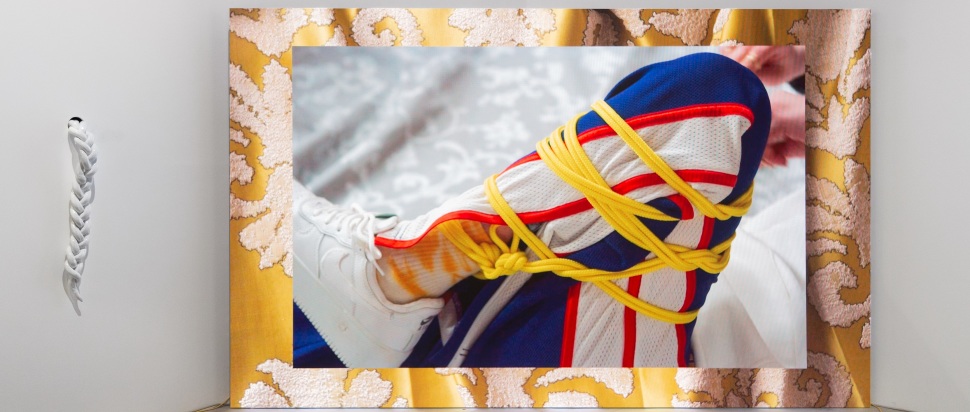'Women from the outside': Elisa Giardina Papa at Collective
Collective open their 40th birthday year with the Scottish premiere of Elisa Giardina Papa’s video installation “U Scantu”: A Disorderly Tale
Although it may not appear so on first encounter, Collective’s City Observatory space on Edinburgh’s Calton Hill is the perfect setting for the Scottish premiere of Elisa Giardina Papa’s "U Scantu": A Disorderly Tale, first screened at the 2022 Venice Biennale. Papa’s film, which is set on the Italian island of Sicily, speaks of joy riders and witch hunts – which, curiously, Calton Hill has distinct connections to. Calton Hill is known as an occasional haunt for joy riders (who, in Papa’s film, drive through the abandoned town of Gibellina Nuova in Sicily). Greenside, which sits on the northern slopes of the hill, was the site where thousands of women accused of being witches were burned at the stake between the 15th and 18th centuries in a religious, frenzied flex of violent misogyny.
Witch trials gripped countries across Europe during this era, and it is the tales of the donne di fora (‘women from the outside and beside themselves’) in Sicily that inspired Papa’s film. She explains that the donne di fora were "said to possess both the feminine and masculine; the human and the animal; the magical and criminal" – identities at odds with the Catholic faith of the Spanish, who colonised Sicily during the period of the Inquisition.
"My work charts their mythology through two completely different archives, which violently collided to become one during the Spanish domination of Sicily. The first archive belongs to the Sicilian oral culture… the second pertains to the history of the Inquisition. That is, in the 16th and 17th centuries, the syncretic (the mixture of different beliefs and thoughts) immaterial heritage of 'the women from the outside and beside themselves' was violently reified in the trials for heresy perpetrated… under the Spanish Crown," the artist explains.
The donne di fora became symbols of persecution and demonisation; punished by the Spanish invaders as "riotous, unruly, and politically troublesome women who were often punished for not being devoted to normative or proprietary notions of selfhood and sexuality," as Papa describes them. The mythology of the donne di fora still lives large in Sicilian life: Papa says that her grandmother used to share their stories with her but "each time with slight variations." Now, she understands the myth as a metaphor for "insurgent practices of life and desire that I interpret as collective anticapitalist, anticolonial, and radically queer repositories."

"U Scantu": A Disorderly Tale by Elisa Giardina Papa. Courtesy of the artist and Galerie Tanja Wagner. Photo credit: Nicolò Gemin.
I ask Papa about the making of the film, a process which took her to Palermo for nearly 12 months: "the highlight in the creation of this work is the temporary ensemble of brilliant individuals who gathered in Palermo, Sicily, to participate in its production. To produce "U Scantu": A Disorderly Tale, I returned to Sicily for almost a year. We were still in the midst of the COVID-19 pandemic, yet poet Megan Fernandes flew from New York to Palermo to collaborate with me… she wrote the poetry that punctuates the visual narration. Artist and streetwear designer Mike Grapes from Savant Vision, based in Brooklyn, also came to the city. In less than a week, he created the looks for the bike tuners by repurposing and remixing items found in flea markets and second-hand stores, collaborating with local artisans."
As well as presenting work as a solo artist, Papa also works as part of Radha May, an international collective, alongside Bathsheba Okwenje and Nupur Mathur; the three met while studying at Rhode Island School of Design. "We came together due to a shared interest in forgotten archives, hidden histories, and peripheral sites and their relation to gender, sexuality, and colonialism. We now work remotely, connecting online between Brooklyn, Cape Town, Palermo and New York." Radha May’s first project was When The Towel Drops Vol.1 | Italy, "a video installation that investigates the censored representation of female and queer bodies and desire in Italian post-war cinema… tracing a history of the institutional regimentation of female and queer bodies." The collective are currently working on a second installation titled When The Towel Drops Vol. 2 – India, which investigates censorship in Bollywood cinema in post-colonial India. The next iteration of the project, currently in progress, will focus on cinema censorship in Apartheid South Africa.
Speaking about the upcoming exhibition of Papa’s film, Collective’s Director Sorcha Carey says: "Collective has a long history of introducing the work of international practitioners to Scotland and the UK. As we look forward to celebrating our 40th anniversary later this year, we are delighted to bring Elisa’s ground-breaking practice and distinctive imaginary to Calton Hill and the City Observatory."
"U Scantu": A Disorderly Tale, Collective, Edinburgh, 1 Mar-19 May
